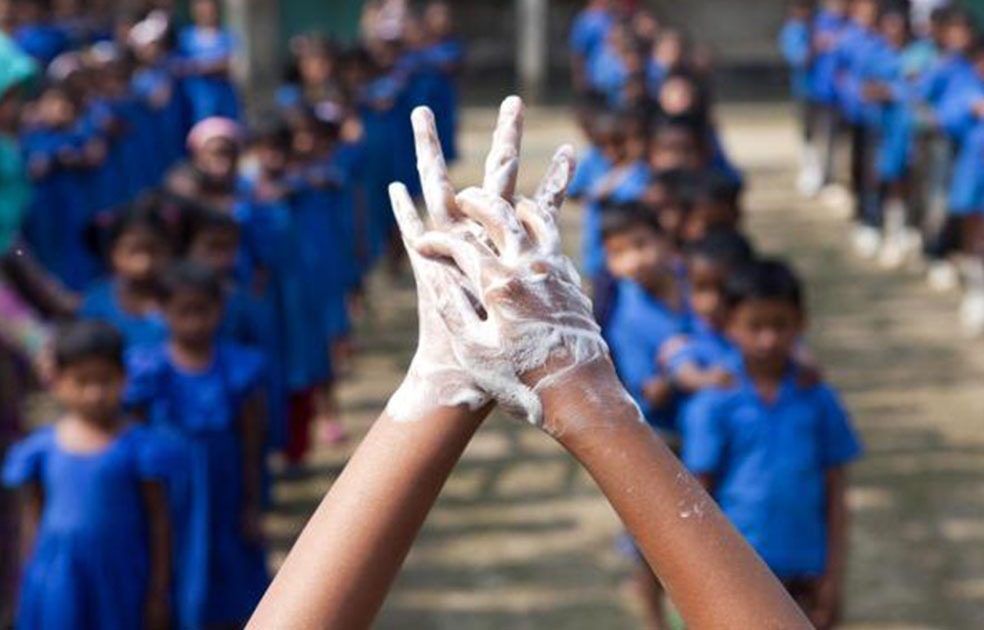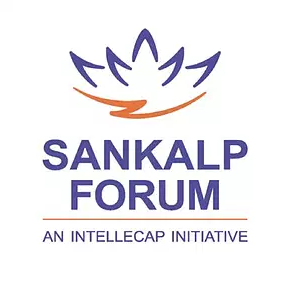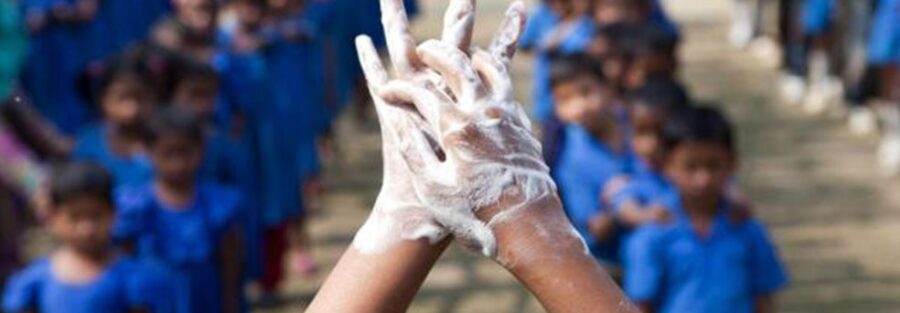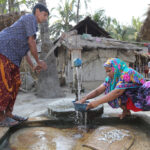

Progress towards achievement of SDG 6 and realizing rights to water and sanitation is far from being reached with 26% of the global population continuing to lack safe drinking water while 46% lack access to well-managed sanitation facilities (A report presented by UNESCO at the UN 2023 Water Conference : https://indianexpress.com/article/world/un-world-water-development-report-2023-clean-water-access-8511880/) The gravity of the situation reflected in absolutes as 2 billion people rely on unsafe drinking water and 3.6 billion people use sanitation services that leave human waste untreated. Challenges to WASH outcomes are similarly reflected in Bangladesh with 3.79 million people in Bangladesh still lacking clean water close to home.75.4 million people (45% of the population) not having decent sanitation infrastructure. Despite success in advancing access to water and sanitation services and substantially reducing open defecation, the country faces challenges in improving hygiene practices and sustainability of WASH services, predominantly water quality and safe disposal of human excreta. The challenges in accessing adequate WASH facilities coupled with poor hygiene practices lead to a rise in diseases which have a ripple effect on the achievement of multiple goals of eradicating hunger and poverty, improving health, increasing parity and access to education and health, and gender equity. Evidently, such challenges have been exaggerated in fragile contexts and the poorest countries.
Recognizing the need for public and private sector entities to collaboratively promote ways of achieving WASH outcomes at scale, Water.org and Intellecap hosted a session titled “Role of SMEs in Sustainable WASH outcomes: prospects and challenges in Bangladesh and India” to explore the opportunity of WASH enterprises to serve 95 million people still lacking access to safely managed water and sanitation facilities in Bangladesh. In addition to breaking down the WASH SME landscape, the discussion aimed to explore challenges of WASH enterprises, including issues of investment readiness, lack of awareness regarding alternative investment platforms and absence of other support systems.
India and Bangladesh due to its wide and attractive demography has the presence of several emerging business solutions that are continually evolving, yet being limited in their growth and capital trajectories due to investments for scale. Bangladesh has a WASH SME ecosystem of about 15000 SMEs that can be divided into 10 old and new sub-sectors of manufacturers of parts for sanitation infrastructure, sanitary napkin producers, water bottling companies, WASH EPCs (water and sewage treatments), and climate resilient innovators pursuing water technology, soap manufacturers, manufacturers of plastic products for WASH etc (WO-Inspira SME landscaping study, 2022). These provide approximately 2 billion worth of products and services every year, which can quadruple if the untapped potential of the market (i.e., 95 million Bangladeshis with lack of access to safe WASH facilities) can in fact be realized.
However, several challenges to scaling of impact are faced by WASH SMEs.
The most common challenge faced by WASH SMEs have been regarding access to finance. With banks being demotivated to fund small ticket sizes while higher ticket sizes requiring collaterals and assets that SME’s may lack, their ability to obtain financing is often limited. Low access to adequate incubation support to SMEs (whose needs for scale, investment, and identification of markets which are not sufficiently met) along with a lack of financial best practices translate into lack of accounting and documentation related best practices, which eventually reduce the investment attractiveness of the enterprises. Absence of proactive approaches of incubating and improving business models that can match pace with market based competition, easily renders SMEs less attractive, especially when compared to already digitized, incubated and inherently scalable start-ups with exponential growth trajectories.
On a systems level, there are further challenges characteristic to the sector. Slow growth of WASH-tech innovation coupled with non-readiness of the investment ecosystem to support disruptive and new solutions for instance, has been a classic challenge for upcoming tech-based WASH SMEs. Being an extremely knowledge based business, 80% WASH SMEs in the country have been traditional manufacturers (40% latrine producer/ONM service providers and 40% plastic WASH item producers) while 20% entailed other service providers (20%). The very nascent water-tech innovation enterprises that do come up, are typically enterprises with high tech-based expertise (digital tools) but low WASH knowledge and experience, and drastically different business models, resulting in low investment attractiveness, especially for traditional impact investors, venture capitalists and accelerators. A lack of well-defined, well articulated government policies for the WASH sector is another challenge that demotivates external investors, especially foreign direct investments.
Towards this, a glimmer of hope is reflected in the public sector front – whereby the PPP Authority has initiated processes for developing strategic framework policies that would enable WASH SMEs to avail larger business opportunities. GoB’s plans such as SMART Bangladesh Vision, Bangladesh Delta Plan 2100 as well as Startup Bangladesh’s efforts, also reflect this commitment towards improving ecosystems for WASH SMEs in the country. Meanwhile, there is also a need for the government to have a multi-pronged approach beyond grants to improve entrepreneurial trends within the country, which would also attract commercial investors.
There is also a huge role that development sector practitioners could play by adopting a Capital+ model whereby, in addition to money – businesses would be provided with knowledge and technical support through strategic incubation and acceleration. With an ecosystem approach of ensuring buy-ins from all relevant stakeholders, work also needs to be done with impact investors towards disbursing “patient capital” wherein adequate support can be provided to SMEs over a period of time, in a way where risks could be managed by experts. Measures like IFC’s Upstream Incubation support, USAID’s First-Loss Investment that de-risk investments of commercial investors as well as blended finance approaches (e.g., EcoFin Fund and Intellecap’s WASH Financing facility) are some ways in which these issues can be addressed. Through solutions like viability gap funds that cover about 40% of project costs, costs of WASH services for the bottom of the pyramid customers can also be reduced, thus promoting uptake of services and ultimately, improving WASH outcomes.




